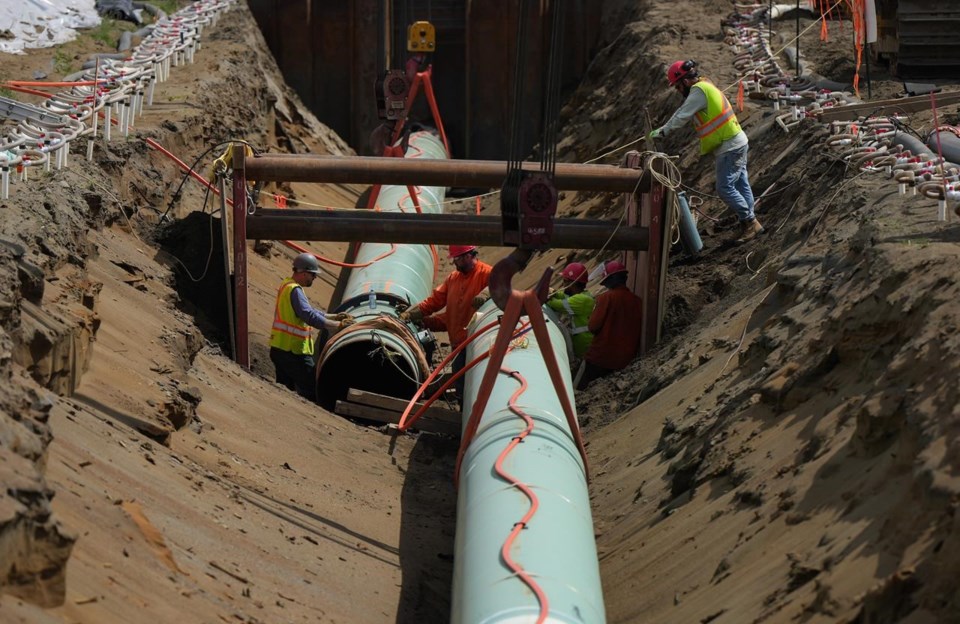CALGARY — The Trans Mountain oil pipeline expansion project has run into another construction-related hurdle that could delay its completion.
The crown corporation that owns the pipeline has filed for regulatory approval to modify the route of one of the remaining stretches of pipe yet to be completed.
In its regulatory filing, Trans Mountain Corp. said it has run into engineering difficulties related to the drilling of a tunnel in B.C. and wants to alter the route slightly for a 1.3-kilometre stretch of pipe, as well as the construction method.
But the filing documents illustrate how the company is facing opposition from the Stk’emlúpsemc te Secwépemc Nation, whose traditional territory the pipeline crosses and who had agreed to the originally proposed route and construction method.
The documents state that between May and July 2023, Trans Mountain Corp. met and corresponded several times with the First Nation's leadership, who continued to express concern that the pipeline project was deviating from its previously agreed-upon route and construction method.
In its filing, Trans Mountain Corp. said it needs the regulator to make a decision as soon as possible to avoid construction delays that could result in "significantly increased construction costs" for the project.
It also warns of costs and impacts to "various third parties who are relying on the timely completion" of the project.
The Trans Mountain pipeline is Canada's only pipeline system transporting oil from Alberta to the West Coast. Its expansion, which is currently under way, will boost the pipeline's capacity to 890,000 barrels per day (bpd) from 300,000 bpd currently.
Trans Mountain Corp.'s target date for the mechanical completion of the expansion project had been sometime during the third quarter of this year, with the pipeline's in-service date expected in early 2024.
However, the project has been plagued by difficulties. The pipeline was bought by the federal government for $4.5 billion in 2018 after previous owner Kinder Morgan Canada Inc. threatened to scrap the pipeline's planned expansion project in the face of environmentalist opposition.
Its projected price tag has since spiraled, first to $12.6 billion, then to $21.4 billion, and most recently, to $30.9 billion (the most recent capital cost estimate, as of March of this year).
Trans Mountain Corp. has blamed the cost overruns on a variety of factors, including inflation, COVID-19, labour and supply chain challenges, flooding in B.C. and unexpected major archeological discoveries along the route.
The federal government has indicated it does not wish to be the long-term owner of Trans Mountain.
On Wednesday, Prime Minister Justin Trudeau confirmed that the government is currently in talks with potential buyers. (A number of Indigenous-led initiatives and partnerships have previously expressed interest in owning the pipeline.)
"I’m very excited and interested that there are so many Indigenous groups interested in purchasing the TMX pipeline," Trudeau told reporters in Charlottetown.
"We’re engaged in conversations with them right now, it would be premature to speculate too much on that."
However, critics have suggested that Trans Mountain's mounting costs will mean the government will have to absorb a significant loss when it does sell the pipeline. Because of the way existing contractual agreements with oil shippers are structured, only a portion of the rising capital costs of the project can be passed on to oil companies in the form of increased tolls. (Tolls are the rates oil companies pay to shift product on a pipeline, and they are how the pipeline company makes money.)
A report from the Parliamentary Budget Officer last year found the federal government stands to lose money from its investment in the pipeline, and suggested that if the project were cancelled at that time, the government would need to write off more than $14 billion in assets.
Trudeau said Wednesday that the pipeline remains an important project for the Canadian economy that ensures future markets for this country's oil and gas resources.
"We are confident that the business case for the Trans Mountain pipeline remains solid," he said.
This report by The Canadian Press was first published Aug. 23, 2023.
Amanda Stephenson, The Canadian Press




